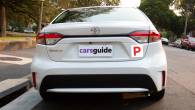Accidents happen. It's a truism too many of us forget, because we all tend to think we're such great drivers that it will never happen to us.
But the clue is in the name - accident - it's not something you were expecting or planning for, although perhaps you should.
Here's what to do if you've been in a bingle - weeping and wailing are, of course, optional.
Be prepared
It might seem like tempting fate, or setting up a self-fulfilling prophecy, but it's actually not a bad idea to have a checklist ready, or even to install an app on your phone like AAMI's Claim Assist (even if you're not insured with them).
This app, which would seem to appeal to the company's very worst customers - the regular crashers - takes you through the post-crash process step by step, helps you to upload the information the insurer requires and even allows you to add photographs of the scene, and the damage to your car.
"Obviously the first thing we'd advise people is to try not to have an accident, but if you do the app is very helpful," an AAMI spokeswoman explains, adding that it has been downloaded more than 103,000 times and used for almost 5000 claims.
"It's hard to think straight after you've been in accident, your adrenaline's racing, you're panicking and sometimes you might just forget to do, or ask, obvious things, but following the steps on your phone makes sure that won't happen."
Don't admit to being at fault for the crash - not to the other driver, the police or anyone
In terms of being prepared, taking a First Aid course isn't a bad idea either, because as awful as it is to consider, injuries are a common enough occurrence in car accidents.
What to say, and when to keep quiet
First and foremost, don't admit to being at fault for the crash - not to the other driver, the police or anyone - even if you feel it was your fault.
"When we've been in an accident we often see things from our perspective and we might not take all the factors into account, so it's best to leave it to the insurers, and the experts, to decide who's at fault," the AAMI spokeswoman says.
It's also important not to make a tense situation even more stressful by accusing the other driver of being at fault.
Try, as hard as it may be, to stay calm, to give as much information as you can to your insurer when you call, and take photos of the location, your car, the other vehicles, anything that might be relevant.
The advent of mobile phones has made the whole process far easier, because everyone now has a camera on them, all the time.
What to ask for
Anyone involved in an accident must provide their name and address, the rego number of the car and the name of the owner of that vehicle and their address - remember that the person driving the car may not necessarily be the owner, or the insured party.
If the police haven't attended of their own accord, you need to call them if someone is injured or if there is property damage
You'll need to make sure you get all this information, and collecting the name of the other person's insurance company is a good idea as well.
When to call the police
If the police haven't attended of their own accord, you need to call them if someone is injured or if there is property damage, meaning cars other than yours, street signs, anything that might need replacing or fixing.
You should also call the police if there's any suspicion of drugs or alcohol being involved.
Should you drive your car away?
It's vital that you make sure your car is roadworthy, and safe, before attempting to drive it away from the scene of the accident.
Check first for damage to the car's safety systems. If an airbag has been deployed, or the pretensioners on the seatbelts have fired and they no longer seem to be working properly, don't drive.
If any of the safety-related lights on the dash cluster remain on when the engine is running, it's not safe to proceed.
If you have even the slightest doubts about your vehicle, it's probably safer to organise a tow truck
Similarly, if there is any damage to the wheels or suspension, this could cause steering failure or other mechanical disasters, so get the car towed instead.
Flat tyres are easy to spot, as are smashed windscreens, but also be wary of damage to the cooling system - look under the car to see if large amounts of fluid are leaking out - because overheating can cause major damage to your engine.
In short, if you have even the slightest doubts about your vehicle, it's probably safer to organise a tow truck and find another way home.



.jpg)

.jpg)


.jpg)
.jpg)
.jpg)

.jpg)
.jpg)
.jpg)


.jpg)

Comments